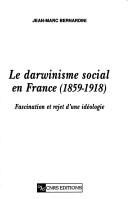| Listing 1 - 10 of 15 | << page >> |
Sort by
|
Book
ISBN: 149820063X 9781498200639 1498200621 9781498200622 Year: 2016 Publisher: Eugene, Oregon
Abstract | Keywords | Export | Availability | Bookmark
 Loading...
Loading...Choose an application
- Reference Manager
- EndNote
- RefWorks (Direct export to RefWorks)
John Hall Snow was professor of pastoral theology at the Episcopal Divinity School and considered preacher-in-residence at Christ Church, Cambridge, Massachusetts, for over eighteen years. In this previously unpublished manuscript, Snow outlines his critique of American culture building on America's adoption of Herbert Spencer's social theory known as ""survival of the fittest."" The unconscious acceptance of his theory has reduced us to ""winners"" and ""losers,"" leading us to disfigure language and truth. Snow writes, ""We lie to others, and ourselves, basically, because we believe that lie
Social Darwinism. --- Darwinism, Social --- Competition --- Social change --- Social conflict --- Social evolution
Book
ISBN: 1469610132 9781469610139 9798890874863 9780807896976 0807896977 Year: 1981 Publisher: Chapel Hill : University of North Carolina Press,
Abstract | Keywords | Export | Availability | Bookmark
 Loading...
Loading...Choose an application
- Reference Manager
- EndNote
- RefWorks (Direct export to RefWorks)
In Germany, more than anywhere else, Darwinism was a sensational success. Setting his analysis against the background of popular science, Kelly follows popular Darwinism as it permeated education, religion, politics, and social thought in Germany. He explains how the popularizers changed Darwin's thought in subtle ways and how these changes colored their perceptions of Darwinism. Among the first purveyors of mass culture, the Germans provide valuable clues as to how seminal ideas move through a society. Originally published in 1981.
Philosophy, German --- Social Darwinism --- Darwinism, Social --- Competition --- Social change --- Social conflict --- Social evolution --- History. --- Darwin, Charles, --- Darwin, Charles, Robert --- Germany --- Intellectual life

ISBN: 2271054834 2271078474 9782271054838 Year: 1997 Publisher: CNRS Éditions
Abstract | Keywords | Export | Availability | Bookmark
 Loading...
Loading...Choose an application
- Reference Manager
- EndNote
- RefWorks (Direct export to RefWorks)
truggle for existence, survival of the fittest ... It has long been believed that the use for political and social purposes of the theories of Charles Darwin was a specialty of the Anglo-Saxon countries only. Contrary to this generally accepted idea, the author maintains that a real Darwinian culture developed in France in the last century, far beyond the inner circle of scientists, and often against their will. For the attention to mediators of a scientific culture, this book shows how in his philosophical debates, religious and political, the France of the long nineteenth ecentury first expressed its fascination and then its reluctance for the new evolutionary ideas of Charles Darwin. The in-depth study of the phenomena of circulation, rooting or rejection of a scientific ideology ultimately sheds a singular light on the resistance of French scientists to Darwinian theories, resistance which made them fall far behind in the field of evolutionary biology.
Social Darwinism --- -Darwinism, Social --- -Social Darwinism --- Darwinism, Social --- Competition --- Social change --- Social conflict --- Social evolution --- Darwinisme social --- France --- History --- 18th-19th centuries --- Darwinism. --- Ideology. --- Knowledge, Theory of --- Philosophy --- Political science --- Psychology --- Thought and thinking --- Social Darwinism - France --- darwinisme social --- racisme --- Troisième République --- eugénisme

ISBN: 1282298275 9786612298271 1400827337 9781400827336 9780691136394 0691136394 9781282298279 6612298278 Year: 2008 Publisher: Princeton, NJ ; Woodstock : Princeton University Press,
Abstract | Keywords | Export | Availability | Bookmark
 Loading...
Loading...Choose an application
- Reference Manager
- EndNote
- RefWorks (Direct export to RefWorks)
Jesus and Darwin do battle on car bumpers across America. Medallions of fish symbolizing Jesus are answered by ones of amphibians stamped "Darwin," and stickers proclaiming "Jesus Loves You" are countered by "Darwin Loves You." The bumper sticker debate might be trivial and the pronouncement that "Darwin Loves You" may seem merely ironic, but George Levine insists that the message contains an unintended truth. In fact, he argues, we can read it straight. Darwin, Levine shows, saw a world from which his theory had banished transcendence as still lovable and enchanted, and we can see it like that too--if we look at his writings and life in a new way. Although Darwin could find sublimity even in ants or worms, the word "Darwinian" has largely been taken to signify a disenchanted world driven by chance and heartless competition. Countering the pervasive view that the facts of Darwin's world must lead to a disenchanting vision of it, Levine shows that Darwin's ideas and the language of his books offer an alternative form of enchantment, a world rich with meaning and value, and more wonderful and beautiful than ever before. Without minimizing or sentimentalizing the harsh qualities of life governed by natural selection, and without deifying Darwin, Levine makes a moving case for an enchanted secularism--a commitment to the value of the natural world and the human striving to understand it.
Natural selection. --- Civilization, Secular. --- Social Darwinism. --- Darwinism, Social --- Competition --- Social change --- Social conflict --- Social evolution --- Secularism --- Darwinism --- Selection, Natural --- Genetics --- Variation (Biology) --- Biological invasions --- Evolution (Biology) --- Heredity --- Darwin, Charles, --- Darwin, Charles, Robert --- Influence. --- Secular civilization
Book
ISBN: 1282334298 9786612334290 1443811742 9781443811743 9781847186195 184718619X Year: 2008 Publisher: Newcastle Cambridge Scholars Pub.
Abstract | Keywords | Export | Availability | Bookmark
 Loading...
Loading...Choose an application
- Reference Manager
- EndNote
- RefWorks (Direct export to RefWorks)
Before oxygen's discovery, scientists invoked a mysterious inner principle of fire to account for burning. Today, scholars appeal to an analogously unscientific inner principle, known as culture, to account for human actions. So what is wrong with culture?! It extends from the contents of Petrie dishes to art galleries and is far too imprecise for scientific use. Science aims to separate causes from effects but social scientists use “culture” indiscriminately as both cause and effect making scientific progress impossible. Finally, culture is a smokescreen distracting us from the quest for objective influences on human behavior. (Polygamy is more about parasites than religion, for instance). This book is both a critique of culture-centered social sciences and the manifesto for a new approach - evolutionary social science - that synthesizes evolution and sociology. The author demonstrates that a natural-science approach to human societies helps us to understand social problems such as health inequality and violent crime. Written in a more high-spirited and accessible style than is customary for academic works, The Myth of Culture is a full-throttle indictment of ivory-tower social scientists whose arcane lore does more to feather their nests than to advance knowledge, or solve human problems. It should have broad appeal among college-educated people around the world.
Social evolution. --- Human evolution. --- Social Darwinism. --- Darwinism, Social --- Competition --- Social change --- Social conflict --- Social evolution --- Evolution (Biology) --- Physical anthropology --- Evolutionary psychology --- Human beings --- Cultural evolution --- Cultural transformation --- Culture, Evolution of --- Culture --- Evolution --- Origin
Book
ISBN: 9780511804755 9780521768931 9780521745956 9781139041959 1139041959 051180475X 0521768934 0521745950 113903572X 1107209315 1283053861 9786613053862 1139041185 1139044583 1139038044 1139040405 9781107209312 9781283053860 6613053864 9781139041188 9781139044585 9781139038041 9781139040402 Year: 2010 Publisher: Cambridge : Cambridge University Press,
Abstract | Keywords | Export | Availability | Bookmark
 Loading...
Loading...Choose an application
- Reference Manager
- EndNote
- RefWorks (Direct export to RefWorks)
Social scientists can learn a lot from evolutionary biology - from systematics and principles of evolutionary ecology to theories of social interaction including competition, conflict and cooperation, as well as niche construction, complexity, eco-evo-devo, and the role of the individual in evolutionary processes. Darwinian sociocultural evolutionary theory applies the logic of Darwinism to social-learning based cultural and social change. With a multidisciplinary approach for graduate biologists, philosophers, sociologists, anthropologists, social psychologists, archaeologists, linguists, economists, political scientists and science and technology specialists, the author presents this model of evolution drawing on a number of sophisticated aspects of biological evolutionary theory. The approach brings together a broad and inclusive theoretical framework for understanding the social sciences which addresses many of the dilemmas at their forefront - the relationship between history and necessity, conflict and cooperation, the ideal and the material and the problems of agency, subjectivity and the nature of social structure.
Social Darwinism. --- Evolution (Biology) --- Animal evolution --- Animals --- Biological evolution --- Darwinism --- Evolutionary biology --- Evolutionary science --- Origin of species --- Biology --- Evolution --- Biological fitness --- Homoplasy --- Natural selection --- Phylogeny --- Darwinism, Social --- Competition --- Social change --- Social conflict --- Social evolution --- Life Sciences --- General and Others

ISBN: 0801438098 0801488761 080146868X 1336207876 0801468671 9780801468681 9780801488764 9780801438097 9780801468674 9781336207875 Year: 2003 Publisher: Ithaca, NY : Cornell University Press,
Abstract | Keywords | Export | Availability | Bookmark
 Loading...
Loading...Choose an application
- Reference Manager
- EndNote
- RefWorks (Direct export to RefWorks)
Patrick Brantlinger here examines the commonly held nineteenth-century view that all "primitive" or "savage" races around the world were doomed sooner or later to extinction. Warlike propensities and presumed cannibalism were regarded as simultaneously noble and suicidal, accelerants of the downfall of other races after contact with white civilization. Brantlinger finds at the heart of this belief the stereotype of the self-exterminating savage, or the view that "savagery" is a sufficient explanation for the ultimate disappearance of "savages" from the grand theater of world history.Humanitarians, according to Brantlinger, saw the problem in the same terms of inevitability (or doom) as did scientists such as Charles Darwin and Thomas Henry Huxley as well as propagandists for empire such as Charles Wentworth Dilke and James Anthony Froude. Brantlinger analyzes the Irish Famine in the context of ideas and theories about primitive races in North America, Australia, New Zealand, and elsewhere. He shows that by the end of the nineteenth century, especially through the influence of the eugenics movement, extinction discourse was ironically applied to "the great white race" in various apocalyptic formulations. With the rise of fascism and Nazism, and with the gradual renewal of aboriginal populations in some parts of the world, by the 1930s the stereotypic idea of "fatal impact" began to unravel, as did also various more general forms of race-based thinking and of social Darwinism.
Eurocentrism. --- Genocide. --- Indigenous peoples. --- Social Darwinism. --- Autochtonen --- Darwinism [Social ] --- Darwinisme social --- Eurocentrism --- Eurocentrisme --- Genocide --- Génocide --- Inboorlingen --- Indigenous peoples --- Indigènes --- Inheemse bevolking --- Inheemsen --- Inlanders --- Native peoples --- Peuples indigènes --- Population autochtone --- Populations indigènes --- Sociaal Darwinisme --- Social Darwinism --- Volkenmoord --- Eurocentricity --- Cleansing, Ethnic --- Ethnic cleansing --- Ethnic purification --- Ethnocide --- Purification, Ethnic --- Darwinism, Social --- Aboriginal peoples --- Aborigines --- Indigenous populations --- Native races --- Ethnocentrism --- Crime --- Competition --- Social change --- Social conflict --- Social evolution --- Ethnology --- Adivasis --- extinction of primitive people, robert knox, alfred wallace, savage races, nineteenth century racialism, nineteenth century extinction discourse. --- Autochtones

ISBN: 0674076540 9780674076549 0674016386 9780674016385 Year: 2004 Publisher: Cambridge, Mass. : Harvard University Press,
Abstract | Keywords | Export | Availability | Bookmark
 Loading...
Loading...Choose an application
- Reference Manager
- EndNote
- RefWorks (Direct export to RefWorks)
In his new preface E. O. Wilson reflects on how he came to write this book: how The Insect Societies led him to write Sociobiology, and how the political and religious uproar that engulfed that book persuaded him to write another book that would better explain the relevance of biology to the understanding of human behavior.
Sociobiology. --- Social Darwinism. --- Darwinism, Social --- Competition --- Social change --- Social conflict --- Social evolution --- Biologism --- Human biology --- Human evolution --- Psychology, Comparative --- Social aspects --- aggression. --- altruism. --- behavioral genetics. --- bioethics. --- biological determinism. --- biology sexual orientation. --- cultural evolution. --- discrimination. --- gene environment interaction. --- heredity. --- human diversity. --- natural selection. --- nature v nurture. --- pulitzer prize. --- religion. --- social darwinism. --- sociobiology.
Book
ISBN: 1443838195 9781443838191 1443837423 9781443837422 Year: 2012 Publisher: Newcastle upon Tyne Cambridge Scholars Publishing
Abstract | Keywords | Export | Availability | Bookmark
 Loading...
Loading...Choose an application
- Reference Manager
- EndNote
- RefWorks (Direct export to RefWorks)
Can Christian theology be reconciled Other Darwin's theory of evolution by natural selection? Can the biological sciences tell us anything of interest from a religious perspective? Does Christianity have anything to offer when it comes to formulating scientific hypotheses? These questions are among those explored in this collection of essays arising from a meeting of the UK Science and Religion Forum held in Cambridge to mark the bicentenary of Darwin's birth and the 150th anniversary of the...
Natural theology. --- Social Darwinism. --- Natural selection. --- Darwinism, Social --- Competition --- Social change --- Social conflict --- Social evolution --- Natural religion --- Theology, Natural --- Apologetics --- God --- Religion --- Religion and science --- Theology --- Philosophy of nature --- Darwinism --- Selection, Natural --- Genetics --- Variation (Biology) --- Biological invasions --- Evolution (Biology) --- Heredity --- Darwin, Charles, --- Darwin, Charles, Robert
Book
ISBN: 036787220X 1844654869 1317544927 1315729105 9781317544913 1317544919 9781315729107 9781317544920 9781317544906 1317544900 9781844652563 1844652564 Year: 2011 Publisher: Durham : Acumen Publishing,
Abstract | Keywords | Export | Availability | Bookmark
 Loading...
Loading...Choose an application
- Reference Manager
- EndNote
- RefWorks (Direct export to RefWorks)
Maria Kronfeldner critically evaluates two influential approaches to cultural change that explain creativity and diffusion as an evolutionary process by drawing an analogy between the Darwinian approach to creativity and the theory of memes, or memetics. The Darwinian approach to creativity maintains that a process of blind variation and selection creates novelty in culture. Memetics goes further by claiming that we can ignore or even eliminate the human mind as the main causal force in the explanation of creativity and culture. In a penetrating analysis Kronfeldner shows analogical reasoning from evolutionary biology to cultural change lacks the necessary descriptive adequacy, explanatory force and heuristic value to be successful. Indeed she shows that both the Darwinian approach to creativity and memetics are mere reformulations, in Darwinian language, of what has been known already and offer no new explanatory tools. The book provides an acute philosophical examination of Darwinian creativity and memetics from within the respective evolutionary approaches including debates from genetics, evolutionary biology, psychology, anthropology, science studies and philosophy.
Social evolution. --- Creative ability. --- Memetics. --- Memes, Study of --- Knowledge, Theory of --- Contagion (Social psychology) --- Idea (Philosophy) --- Memes --- Creativeness --- Creativity --- Ability --- Creation (Literary, artistic, etc.) --- Cultural evolution --- Cultural transformation --- Culture, Evolution of --- Culture --- Evolution --- Social change --- Social Darwinism. --- Darwinism, Social --- Competition --- Social conflict --- Social evolution
| Listing 1 - 10 of 15 | << page >> |
Sort by
|

 Search
Search Feedback
Feedback About
About Help
Help News
News